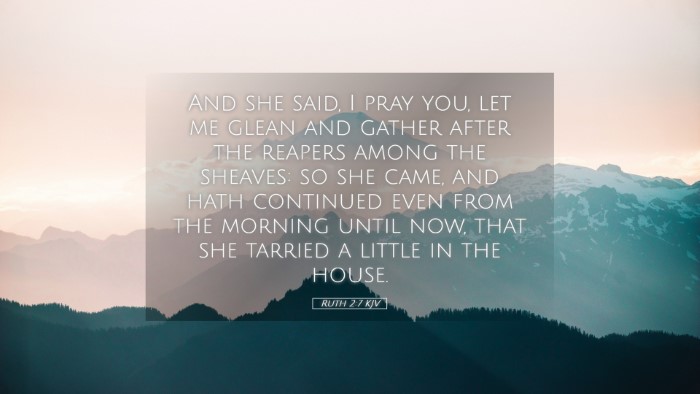Old Testament
Genesis Exodus Leviticus Numbers Deuteronomy Joshua Judges Ruth 1 Samuel 2 Samuel 1 Kings 2 Kings 1 Chronicles 2 Chronicles Ezra Nehemiah Esther Job Psalms Proverbs Ecclesiastes Song of Solomon Isaiah Jeremiah Lamentations Ezekiel Daniel Hosea Joel Amos Obadiah Jonah Micah Nahum Habakkuk Zephaniah Haggai Zechariah MalachiRuth 2:7
Ruth 2:7 KJV
And she said, I pray you, let me glean and gather after the reapers among the sheaves: so she came, and hath continued even from the morning until now, that she tarried a little in the house.
Ruth 2:7 Bible Commentary
Commentary on Ruth 2:7
Bible Verse: Ruth 2:7 - "And she said, 'Please let me glean and gather among the sheaves after the reapers.' So she came and has continued from morning until now, though she rested a little in the house."
Introduction
The narrative of Ruth provides profound insights into God's providence, the nature of loyalty, and the significance of humble labor. Ruth 2:7 serves as a pivotal moment in which we see Ruth's determination and the humility of her character as she seeks sustenance for herself and her mother-in-law, Naomi. This commentary will explore the implications of this verse through various lenses derived from public domain commentaries by renowned theologians.
Insights from Commentaries
Matthew Henry's Commentary
According to Matthew Henry, Ruth's request to glean was not merely a matter of survival but signified her commitment to hard work and resilience. He emphasizes her choice to work among the sheaves left by the reapers, which demonstrates both her diligence and her understanding of the cultural practices surrounding gleaning.
Henry points out that Ruth’s initiative to seek permission reflects her character—she was not one to wait idly for her needs to be met but actively sought out ways to provide for herself and Naomi. This speaks volumes about her integrity and personal responsibility, traits highly esteemed in biblical scripture.
Albert Barnes' Notes
Albert Barnes highlights the importance of gleaning as a provision mentioned in the Mosaic Law, which outlines specific rights for the poor and foreigner. He notes Ruth's endurance in her efforts from morning until she "rested a little in the house" illustrates the depth of her commitment. Ruth's perseverance underlines a fundamental principle in Christian theology: that the faithful will be rewarded through their labor.
Additionally, Barnes remarks on the cultural implications of Ruth's status as a Moabite. Her need to seek approval to glean reflects the societal barriers she faced while also showcasing her resolve to overcome them. Ruth serves as an example of faith and diligence that transcends her origins, suggesting that God's love and provision are available to all who seek Him.
Adam Clarke's Commentary
Adam Clarke offers a thorough examination of Ruth's actions. He interprets the phrase "though she rested a little in the house" as a testament to her tireless work ethic. Clarke notes that even during moments of rest, Ruth’s mind was likely focused on the task at hand—the well-being of Naomi and herself.
Clarke also discusses the symbolism of gleaning, explaining that it serves as a spiritual metaphor for seeking God's provision in our lives. Just as Ruth gathered the leftovers, believers are encouraged to seek the remnants of God's grace in their daily lives, trusting that He will meet their needs through their labor of faith.
Theological Reflections
This verse encapsulates themes of hard work, divine provision, and social justice. The act of gleaning speaks to the importance of caring for the marginalized, as dictated by the law, and underscores God's heart for the poor and disadvantaged. It serves as an invitation for modern believers to reflect on how they can embody these values in their communities.
Cultural and Historical Context
The practice of gleaning was rooted in ancient Near Eastern agricultural customs, where farmers were commanded to leave portions of their harvest for the needy (Leviticus 19:9-10). Understanding this cultural backdrop enriches the reading of Ruth’s actions and its implications for social ethics.
Ruth’s status as a foreigner and a widow amplifies the power of her story as she navigates the societal structures of Bethlehem. The verse highlights her courage to step outside her comfort zone to seek provision, which is a powerful reminder of God’s faithfulness and care for those who place their trust in Him.
Application for Pastors and Scholars
For pastors and theologians, Ruth 2:7 is a rich text that invites discussion on themes of perseverance, the necessity of work, and the nature of God's grace. It challenges the church to consider how it can support the efforts of the marginalized and encourage its members to engage in acts of service and stewardship.
Call to Action
- Encourage Community Engagement: Pastors can motivate their congregations to actively care for the poor and the outsider, reflecting Ruth’s example.
- Promote Hard Work and Perseverance: Sermons can highlight the importance of diligence in pursuing God’s provision, paralleling Ruth's actions with the believer's own journey of faith.
- Study Groups and Discussion: Scholars can lead studies on the socio-economic practices outlined in the Old Testament, using Ruth’s story as a case study for examining God’s provision.
Conclusion
The insights derived from Ruth 2:7 remind readers of the profound interplay between human agency and divine providence. Ruth's willingness to glean not only provided for her physical needs but also illustrates her deep faith, loyalty, and initiative. For modern believers, the challenge lies in balancing trust in God’s provision while actively participating in the work of their faith.


